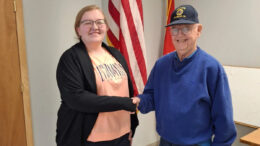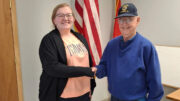If there is a big studio movie that’s more generally crowd-pleasing than “Green Book ” this season, I have yet to find it. In this landscape of challenging, provocative, edgy films, Viggo Mortensen, Mahershala Ali and, of all people, director Peter Farrelly have come along with a movie about friendship that goes down so easy that it’s almost suspect, as though it were flung out of 1996 and gifted to our weary 2018 brains.
Based on a true story, “Green Book” recounts a 1962 road trip when a Bronx bred Italian-American Frank Anthony Vallelonga, also known as Tony Lip (Mortensen), was hired to drive a renowned black pianist, Dr. Don Shirley (Ali), to all of his concert engagements across the Deep South.
The two men are obviously mismatched — what would anyone have to learn if they weren’t? Tony is a working-class bruiser and world class eater with a wife (Linda Cardellini), two sons, a limited vocabulary, institutional racism, but a generally good heart. Dr. Shirley is a wealthy, erudite dandy, a master of his art, a snob and a loner. He also knows he needs reliable protection on this journey to a segregated south, asks around and finds this Copacabana bouncer Tony Lip is the one for the job despite the prejudices.
The constructs will feel familiar and well-worn and surprises are few on this journey toward acceptance and friendship, but the pleasure of this film is in the larger than life characters created by the two leads and their perfectly askew chemistry. Mortensen is almost unrecognizable as Tony, packing extra pounds and an astute comedic sensibility. He knows just how far to push his caricature without making it cartoonish. When Dr. Shirley says to make sure that there’s a Steinway piano at every concert venue, Tony scribbles down “STAINWAY” on a sheet of paper. His doltishness is endearing, not annoying.
And Ali, so memorable and heart-wrenching in “Moonlight,” puts his own stamp on a character who feels alienated from his own race and those he’s performing for. Although a considerably more staid role than Tony, Ali also manages to have his own fun with Dr. Shirley’s seemingly incurable snobbery, wincing at Tony’s lack of decorum, or care.
In fact, this film allows everyone to play against their Hollywood-prescribed “type,” from the actors to the director, who is perhaps the most surprising revelation of them all.
The Farrelly name conjures up a very specific kind of movie: The big, bawdy comedy that he and his brother made their own and, later, failed to keep fresh. If anything, the charm and success of “Green Book” makes a heck of a case for giving directors more room to work outside of the genres or styles that they became famous for.
There is certainly a more serious story to be told out of this road trip, and about Dr. Shirley’s extraordinary life. “Green Book,” taken from the title of the guide Tony has to use to find the establishments and hotels where people of color are welcome at throughout the South, scratches at the surface of the horrors and indignities Dr. Shirley faced while being a “guest of honor.” Those range from being asked to use an outdoor toilet to being denied the right to dine in the place he’s about to perform. This film chooses a different route, and is in turn funny, heart-warming, illuminating and a joy to watch.
“Green Book,” a Universal Pictures release, is rated PG-13 by the Motion Picture Association of America for “thematic content, language including racial epithets, smoking, some violence and suggestive material.” Running time: 130 minutes. Three and a half stars out of four.
___
MPAA Definition of PG-13: Parents strongly cautioned. Some material may be inappropriate for children under 13.








































